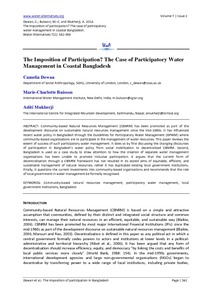Review paper on ‘Garden Kits’ in Africa: lessons learned and the potential of improved water management
The purpose of this paper is to synthesize the available knowledge and lessons learned from past experiences in promoting kitchen or home gardens for food production, with a special emphasis on water management. The benefits of home gardens for better family nutrition, health status of children and mothers, and as an entry point for empowering women have been documented in some studies. However, there is very little specific evidence to confirm these benefits. The paper also reviews some of the water management practices and garden technologies used in home and market gardens.
Roman water law in rural Africa: the unfinished business of colonial dispossession
This paper discusses four questions about the recent water law reforms in Sub-Saharan Africa, which strengthen permit systems. First, do permit systems continue to dispossess rural small-scale users, as intended by European colonizers who introduced principles of Roman law? Second, is it wrong to assume that one can convert one legal system (customary water rights) into another legal system (permits) in the short term? Third, do current permit systems discriminate against small-scale users?
Shifting to hydrological/hydrographic boundaries: a comparative assessment of national policy implementation in the Zerafshan and Ferghana Valleys
In the literature on the implementation of national policies there is an assumption that these get implemented uniformly within one country. Here, with a focus on the implementation of national policy on shifting from administrative to hydrological/ hydrographic principles of water management in the Zerafshan Valley and the Ferghana Valley in Uzbekistan, this assumption is questioned. The case study demonstrates that national policies are resisted by lower-level bureaucrats, leading to diverse, even contradictory, outcomes of the same policy.
The imposition of participation? the case of participatory water management in coastal bangladesh
The imposition of participation?: the case of participatory water management in coastal Bangladesh
Community-based Natural Resources Management (CBNRM) has been promoted as part of the development discourse on sustainable natural resources management since the mid-1980s. It has influenced recent water policy in Bangladesh through the Guidelines for Participatory Water Management (GPWM) where community-based organisations are to participate in the management of water resources. This paper reviews the extent of success of such participatory water management.
The politics of IWRM in southern Africa
This article offers an approach to the study of the evolution, spread and uptake of integrated water resources management (IWRM). Specifically, it looks at the flow of IWRM as an idea in international and national fora, its translation and adoption into national contexts, and the on-the-ground practices of IWRM.
The water reform in Burkina Faso between discourse and reality: the case of water user associations in Bougouriba water basin in SW [South West region] Burkina Faso [Abstract only]
For two decades now Burkina Faso has been trying to adopt the global concept of IWRM. The official texts were developed between 1996 and 2001, while the experiment was being put into action in the Nakambe river basin. Following a positive outcome, the Action plan on integrated water resource management was adopted in 2003, defining a strategy and action plan to be executed by the water resource management by the 2015 deadline.
Water budgeting and management: enhancing aquacultural water productivity
Water productivity and water footprint: misguided concepts or useful tools in water management and policy?
Water productivity (WP) and water footprint (WFP) are popular concepts in research and discourses on water management. Yet there are concerns about their theoretical validity and practical value. This paper shows that the water production function, the concept with a sound theoretical foundation, is the basis for WP. Total WFP is the reciprocal of WP. The practical value of WP and WFP depends on the context of water use and stress. Maximizing WP, not a panacea to all water problems, mainly suits arid rainfed areas.


